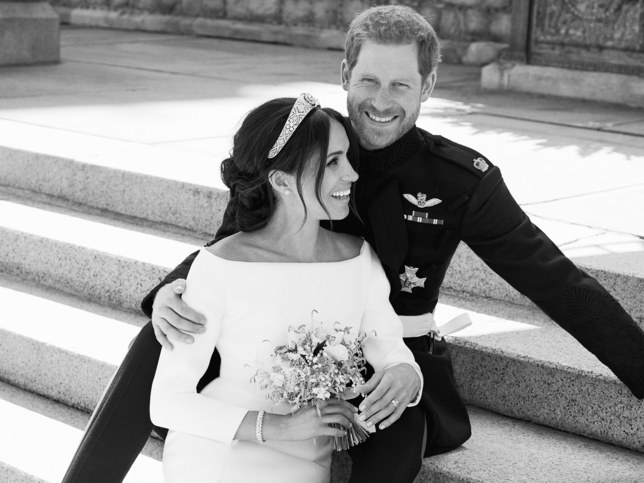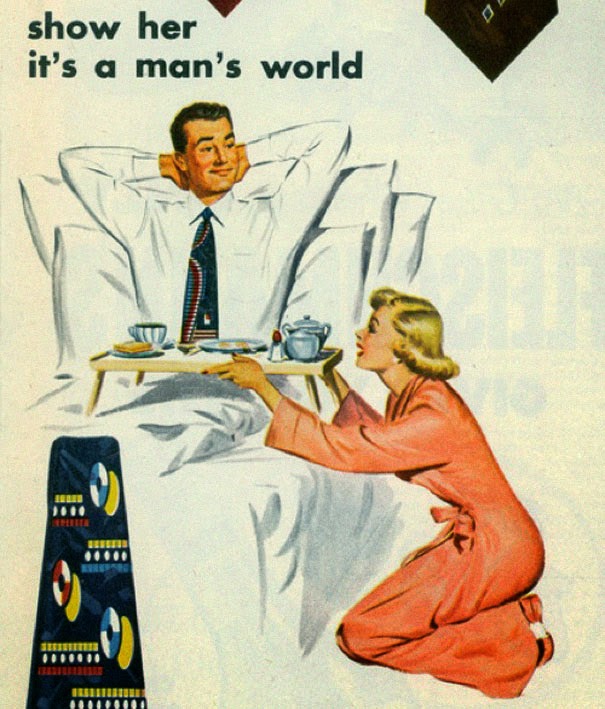I wonder what I would do if I had one of those Nigerian mothers-in-law. You know, the ones who want their sons’ wives to kneel at every occasion of greeting, who think they have the right to scream at and even hit their daughters-in-law, who think their sons’ new wives are unpaid domestic help? How common are they anyway? Is this another narrative designed to portray Nigerian women as demons?

I’m hoping, at least, that the evil Nollywood mother-in-law is a caricature which has been exaggerated for entertainment (much like the evil Nollywood daughter-in-law who instead of saying “I don’t like the way that you are speaking to me”, snarls inexplicitly “If you mess with me again, I will kill you!”). One clip that recently1 made the rounds on Twitter is from a film featuring a younger Funke Akindele-Bello. Her character’s husband tastes a meal she has prepared, coughs dramatically and complains that it is too spicy.
“I’m sorry, honey. It was a mistake.” she says sadly, abandoning her comedy accent and emphasising first syllable of ‘mistake’, late nineties/early noughties Nollywood style (incidentally this was the second time I’d heard Akindele speak without her comedy accent. The first was at the 2016 AMVCA awards. Before then, I had, in a very patronising way, been congratulating Nollywood for promoting an actress with a strong regional accent contrary to their previous obsession with Western accents. Imagine my shock when she gave her thanks for the award and announced in a transatlantic accent “You guys rock!” The whole thing has gone full circle and posh young Nigerian entertainers, who were educated in foreign, elite and/or private institutions, are at pains to demonstrate with their accents how close they are to the average Nigerian. Ah…the joy of a completely unrelated rant!).
Anyway, back to the film. Seconds after Akindele delivered this line, her character’s freshly-faced mother-in-law burst forth from the kitchen, armed with a fully cooked alternative meal for her son and an arsenal of insults and aspersions about the wife’s upbringing.
What would I do in that kind of marriage? I doubt I would do the right thing which is either to get a divorce or politely refuse to respond to such treatment, enduring whatever physical or verbal abuse may come my way as a result. I think I’d either become a slave or a psycho. Either way, there’s a high chance it would end with murder and mayhem, after a few long years as slave-Tracy and very quickly as psycho-Tracy or maybe at the funeral of said mother-in-law when someone comments that I don’t look sad enough.
I think with the state and society sanctioned inferior status of women in Nigeria, it’s easy to think of reasons why a mother-in-law would wield her power over her son’s wife. It’s possible that, having had to put up with similar treatment as a daughter-in-law herself, she feels it is only fair to flex her muscles when someone is stupid enough to marry her son. Her time has come, as we used to say, but the serious point is that it is very common for an oppressed person to seek to emulate their oppressor when dealing with someone on an even lower rung than them.
Also, quite a lot of Nigerian women seem to find disrespect from their “fellow woman” very difficult to bear. Add to this a very strong culture of respect for elders and a lack of tolerance for disrespect, or even disagreement, from a younger person and the fact that a young person is supposed to treat their parents, their friend’s parents and therefore their spouse’s parent with the utmost respect, and one can easily see the potential for some serious abuse of power.
I’m not saying all Nigerian mothers-in-law behave badly towards their daughters-in-law but judging by some of the stories even positive behaviour can be benevolent rather than good. The stereotype goes something like this: the daughter-in-law is only rewarded if she is the epitome of respect and subservience and a potential source of unpaid labour at all times. She must always be delighted to see her mother in law. She must never forget to call her ‘mummy’. She is expected to anticipate that her mother-in-law can act irrationally at any time. She herself is never granted any leniency to have a bad day. She must communicate any complaint she has through her husband.
If, and this is a big if, any of this is true in a substantial number of marriages, I marvel at the things I get away with with my own mother-in-law. I also get very suspicious when a Nigerian woman starts praising her daughter-in-law (I’m mad, I know). What has she had to endure to merit such praise, I wonder? I’d almost be more comfortable if she said ‘Gosh, I love my daughter-in-law but she really can be a bitch sometimes’, I feel like at least that the daughter has been allowed to be human.
Now I’m a hundred percent sure that many Nigerian mothers-in-law are kind, gracious, respectful and loving and don’t only respond to extreme subservience. But if you are an African woman reading this, imagine this scenario. Your daughter-in-law has just had your new grandchild, is wretched with sleepless nights because of a colicky, constantly-feeding baby, raw bleeding nipples and the fact that she can feel her tummy dragging her C-section stitches every time she tries to get comfortable in bed. Now let’s say she responds with a bad-tempered ‘Not right now, mum!’ or ‘Can it!’ when you ask her ‘won’t you do your hair?’ (I’m not judging; stupid questions happen to all of us). Would you be more concerned that she is so overwhelmed by the experience that she has acted out of character or the massive disrespect that has come your way (apart from worrying, quite naturally, that this will become accepted behaviour on her part)?
In The UK
It’s easy to point to reasons why there’s this dysfunction in mother/daughter-in-law relationships in Nigeria but it also exists in the UK and presumably the rest of West. One reason is, despite my use of the word hangover, the misogynistic reasons that may apply in Nigeria were firmly entrenched in Britain not so long ago. Of course, a substantial part of Britain’s diverse population is made out of 1st and 2nd generation Africans (and Asians) and some of the more traditional attitudes regarding marriage and this particular relationship persist. But is the modern-day division just (or even) the result of misogyny or are there other psychological factors at play?
All I can say about my own mother-in-law, apart from the fact I love her dearly, is that she’s extremely generous, liberal and tolerant. I try to be courteous and loving but am allowed to have bad moments and days. Having said that, the relationship is not without its difficulties in communication. We’ve had different upbringing and life experiences that have made me more protective of the children than perhaps she would like. I’ve been told by other women that they found their relationship with their mother-in-law to be tricky. One day my mother-in-law surprised me by telling me she hated her own mother-in-law!
Complaints on Mumsnet (or Netmums) and blogs are more subtle than Nigerian examples – they are complaints of manipulation, power struggles especially regarding the kids, implicit undermining and of course criticism about how mum keeps the house and raises the children. Issues that have come up include whether mum should stay at home or work (subtle, very subtle “Oh I don’t blame you for not having time to do so and so. You career women are so busy. In my day, I just led a simple life and took care of my family. Simple old me!” and other declarations of war) or whether babies should be breastfed and for how long.
I read an article in which the author expressed her lack of comprehension at her own need to explain to her mother-in-law in explicit terms exactly why she disagreed with suggestions by the latter. I can relate. If a friend makes a suggestion that I don’t like, I can fob it off with an excuse without expressly disagreeing (while secretly thinking that she’s lost the plot). If my mother-in-law makes one, it seems absolutely compulsory to tell her expressly that I don’t agree and give a reason (or 300) why. Very odd. Perhaps I feel that if I don’t say something now, whatever she has suggested will become the absolute rule. An almost opposite problem is friends tell me that while you can tell your own mother to go away, you can’t do that with someone else’s, even your partner.
Modern Living
There are clearly other reasons here that have nothing to do with sexism. A lot of people point out that while you choose your partner, neither you or your mother-in-law (who I will call ‘MIL’ for the rest of the article) chose to be in each other’s lives. The portrayal in pop culture of mother and daughters-in-law at war may mean that there is among polite people, a determined effort to make the relationship work (not all English people. A work colleague told us that her mother-in-law tried to punch her at her wedding. I never got the full story but there was something about her playing the guitar and singing at her own wedding that appeared to tip MIL over the edge. What kind of resentment must have been building up in MIL for that to happen? And why wait until the wedding?). You have to act as if you are in love with each other from the day you meet and it can be a shocking realisation when the mask occasionally slips.
Another reason may be a tension between MIL’s and mum’s needs. In modern UK, mum is often juggling work and a number of hobbies or sidelines she may have as well trying to live up to high standards of motherhood in a society where people are very sensitive to criticism. What she may want (or thinks she wants) is support from MIL on her terms. MIL may be retired and may have less mandatory obligations. Yes, she wants to help but she also wants to feel that she matters. She wants a stake in her grand children’s upbringing (which may be interpreted by daughter as wanting to re-live her glory matriarchal days; children can of course bring out wide cracks in the pretend love affair that MIL and mum have been engaging in since husband introduced the woman he was going to marry) but she also wants a relationship with the family. Often times, what is seen as criticism is a desire to contribute more than anything else.
Gender Issues
However, I do think there are some gender issues (of course I do!). Someone on Netmums thought the difficulty that a poster had with her mother-in-law stemmed from the fact that her son defers to his wife in a way that he hasn’t done to his mother since reaching adolescence. This seems like a fairly plausible theory. But if this is the case, why doesn’t it happen more often with fathers and sons-in-law? That would make sense because people push around the theory that sons are more attached to their mothers and fathers to their daughters (snotty as I am about such gender-based generalisations, I must confess that when my daughter started talking she referred to my husband as ‘Daddy’ and to me as ‘Daddy Tracy’). Why aren’t fathers-in-law upset that their daughters now defer to their husbands? Is it because men are more likely to defer to women (and sneakily pass on all the labour) when it comes to household and baby matters, than the other way round? Or is there some discomfort, linked to the stereotype of the conniving, shrill, emasculating wife (every mother’s nightmare apparently ), that makes MIL uncomfortable about seeing her son ‘defer’ to his wife?
Digging deep, I also think there’s something in the re-living of the matriarchal days. This is probably dying out to some extent as people born in the 1970’s and later are becoming grandmothers, but it almost goes without saying that some of today’s mothers-in-law lived in different times. Their role was firmly centred around the family and the house and it created a definite sense of identity for women. Modern women want an identity outside the home but at the same time desperately don’t want to miss out on the ideals of motherhood even though in reality, we may be overwhelmed by work and our unfair share of domestic labour. MIL may, seeing us, miss the sense of identity that came with being the grand matriarch.I’m convinced that the above sometimes pits mothers-in-law and daughters against each other.

Bizarrely the resentment seems to start even before they meet. How many hours did my friends and I spend as young girls trying to figure out our reaction to terrible things that our mythical evil mothers-in-law would do to us? Oddly enough, being a mum, to a 6 year old son, I feel quite stressed out when I see the same thing on Twitter. Threads are written about how mothers should take responsibility (including and up to being imprisoned) for their sons’ bad behaviour and how it is the mother’s fault if the son is domestically useless. They may be right but why isn’t any blame being laid at the dad-in law’s feet? The risk is that these women, while being fully prepared to go to war with their partner’s mothers, will be kind and over-indulgent to their future father-in-law and so the circle of men avoiding responsibility begins again. Men are allowed to opt out of this seemingly petty conflict.
Stereotyping doesn’t help either, like the evil mother in law cliché (this is thankfully dying out too), as it also demonises and ridicules older women, who having exhausted their ‘sexual and beauty capital’ have nothing to offer society except for comedy fodder because of their apparently weird and irrational ways.
I hate that this division exists. I hate that I am more likely to challenge my mother-in-law than male relatives when they are being patronising to her. I must work on that. I’m not entirely sure that passing any difficulty through your husband helps. Not only does he sometimes definitely fail to communicate accurately and effectively; why do we have to participate in this childishness which seems a bit like the adult equivalent of passing notes in class? Why shouldn’t mothers and daughters-in-law be able to speak freely and respectfully to each other? It all adds to the pitting and dividing of mother against daughter-in-law, woman against woman.
1‘Recently’ at the time of first draft































